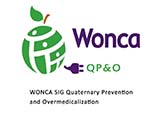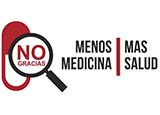The Preventing Overdiagnosis 2022 conference will be hosted by the University of Calgary, Alberta, Canada 9-12 June 2022.
We are accepting submissions for: Poster; Poster +; Oral; Workshops; Seminars and the Lisa M Schwartz 2022 Scholarship.
As well as academic abstracts we are accepting written pieces according to your observations of, clinical/other work or related/lived experiences of Overdiagnosis. You might have a project proposal you are seeking collaborators for and would like feedback on before submitting for funding. Written pieces will be considered for presenting in a panel/seminar format with other related submissions.
The overall theme for this is Evidence, Equity and Post Pandemic Health Care with cross cutting themes of
- Equity & Equality: disparities in healthcare provision, marginalized populations, conflicts of interest driving inequity
- Sustainability and lessons learned from COVID-19: repurposing healthcare after a pandemic
- Medicalizing citizens: the harms of screening, disease thresholds, industry influences, the role of media
- The role of specialists in generating Overdiagnosis and their efforts to mitigate it
- Clinical Practice: Other dimensions of ODx, overtesting and the harms of too much medicine
Please note research abstracts and written perspectives abstracts are accepted on all aspects of ODx.
Deadline for POD face to face Abstract Submissions is April 14th 2022 – These abstracts will be reviewed and notifications of decision sent before the end of April 2022.
You can enter your abstract in full (500 words) or sections - Objectives, Methods, Results & Conclusions (150 words each)
NB: Please insert N/A to any mandatory fields where there is no content to be added.
Lisa M Schwartz Scholarship
The Lisa M Schwartz Scholarship provides awardees with PODC delegate registration, funding towards travel and accommodation and the opportunity to present at Preventing Overdiagnosis.
Submissions for the scholarship should address an issue of relevance to Dr Schwartz’s work and interests, and be consistent with the vision and values Dr Schwartz championed in the communication of risk.
“What we are hoping to change in medical communication is for people to get closer to the truth. A lot of what you read about medicine sounds too good to be true, or sometimes even too bad to be true. Our goal has been to give people a realistic sense of what is known and what is not known – how hopeful or worried they should be. We want to provide understandable medical information that hasn’t been influenced by other interests and that isn’t trying to sell or promote anything.”
Dr. Schwartz made invaluable contributions to improving how we understand and communicate the potential benefits and harms of medical treatments and tests, and about expanding disease definitions: lowering diagnostic thresholds, and risks turning ordinary experiences like shyness or restlessness into disease.
Dr. Schwartz was a person of enormous integrity, kindness and compassion, a brilliant thinker, writer, colleague, clinician, mentor and friend.
Application process
- Submissions should be made through the call for abstracts portal Lisa M Schwartz Scholarship
- Submit a 500-word abstract that addresses how we better understand and communicate the potential benefits and harms of medicine.
- References are not obligatory and the word count is affected by the inclusion of references.
Accepted submissions will be published on the Preventing Overdiagnosis website and in the BMJ Evidence-Based Medicine journal supplement when accompanied with a SIGNED licence to publish.
To be accepted, applicants must meet one of the following eligibility criteria:
- A student or an early-career researcher enrolled in a health-related program of study at a university or comparable institution
- A health professional less than 5 years out of a training program
- A postdoctoral researcher in any health-related discipline less than 10 years post PhD and not holding a permanent academic post in a university or comparable institution
- A patient or member of the public who is campaigning for better communication using evidence
Preventing Overdiagnosis is a not for profit event and has a strict policy of no industry funding or sponsorship. Surplus generated from previous conferences is funding The Lisa M Schwartz Scholarship.
Information for Presenters
Oral Presentations
Authors are allocated 15 minutes, ten plus five for questions. Please keep to the time limit to ensure all presenters receive equal opportunity.
Room allocation, running order and Chairperson can be found in the conference app and downloadable programme available via the homepage. Please note the running order is subject to change in case of any absences or if papers are better suited in a different order.
Using your own laptop is not a problem but can delay proceedings. We will request that you present last to avoid eating into the session time. Note, this could cut your own presentation time short.
Presentations will not be requested prior to the conference, please bring a copy with you on a USB stick for transferring onto the laptop already set up in the room.
Rooms will be open 30 minutes before each session for you to load (and run through) slides.
Clearly labelled presentations should be placed into a pre-named folder e.g. Monday September 5th am/pm on the desk top, a team member will be available to offer assistance if needed.
A seat marked Reserved will be made available for you at the front row. Please be in the room and prepared at least five minutes before the session is due to start.
Poster Presentations
Each poster must be on view up to and including the last break on the last day of the event.
The mounting board for each poster is 6′ high x 3′ wide (portrait) and can accommodate one A0 poster each side.
Poster boards will be numbered. Your poster number will be the number beside your title in the programme available via the conference app. Velcro fastenings will be provided.
Workshop 90 minutes - Workshops are led by one or more facilitators and should include objectives and learning outcomes. Participants should work, think and process. lots of interaction, not just a talking shop.
Seminar 60 minutes - This involves more individual thinking, with one or two people opening the seminar with an introduction to the discussion point. This is followed by a full group discussion on the topic, question or idea that has been put forward.
Sign up for alerts at www.preventingoverdiagnosis.net to be kept informed of news and updates regarding the conference.
Don’t forget to complete the BMJ licence to publish document so that your abstract can be added to a special edition of the BMJ Evidence-Based Medicine Journal.








